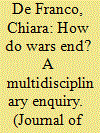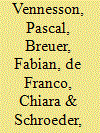| Srl | Item |
| 1 |
ID:
169103


|
|
|
|
|
| Summary/Abstract |
The cessation of military confrontations rarely coincides with the end of war. Legal and political matters continue after the last shot has been fired, civilians driven from their homes try to rebuild their houses and their lives, veterans need to adapt to their new role in civil society, and the struggle to define the history and the significance of past events only begins. In recent years, in particular, the changes in the character of contemporary warfare have created uncertainties across different disciplines about how to identify and conceptualise the end of war. It is therefore an opportune moment to examine how wars end from a multidisciplinary perspective that combines enquiries into the politics of war, the laws of war and the military and intellectual history of war. This approach enables both an understanding of how ‘the end’ as a concept informs the understanding of war in international relations, in international law and in history and a reconsideration of the nature of scientific method in the field of war studies as such.
|
|
|
|
|
|
|
|
|
|
|
|
|
|
|
|
| 2 |
ID:
088936


|
|
|
|
|
| Publication |
2009.
|
| Summary/Abstract |
Europe is the region of the world where the network of security institutions is the densest. Yet, these institutions did not erase differences about conceptions of force employment among European countries and between European countries and the United States. Why have concepts of military power and force employment remained distinct and varied in Europe, and yet, what facilitates their convergence at the European Union level into the ambiguous notion of crisis management? We argue that an important answer to these questions is endogenous to the military: both role conceptions and organizational frames of military institutions are key underlying aspects of the differences at the national level and of the common ground at the European Union level. We examine and compare empirically the role conceptions and organizational frames of the armed forces in France, Germany, Italy, and the United Kingdom since the early 1990s
|
|
|
|
|
|
|
|
|
|
|
|
|
|
|
|